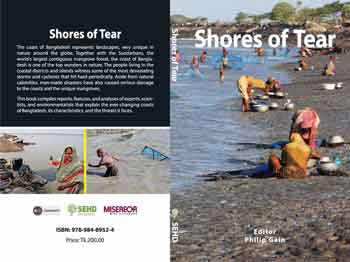Together with the Sundarbans, the world’s largest contiguous mangrove forest, the coast of Bangladesh is one of the top wonders in nature.
2013, English, 134 pages, Paperback Tk.200 / US$5
 Together with the Sundarbans, the world’s largest contiguous mangrove forest, the coast of Bangladesh is one of the top wonders in nature. Nowhere else in the coasts do people live with man-eating tigers like the people of the southwestern part of Bangladesh. The people living in the coastal districts and islands witness some of the most devastating storms and cyclones that hit periodically. During the past few decades these storms and cyclones have taken the lives of hundreds of thousands of people in the coasts and have caused enormous damages to the biomass that the mangroves sustain. Aside from natural calamities, man-made disasters have also caused serious damage to the coasts and the unique mangroves.
Together with the Sundarbans, the world’s largest contiguous mangrove forest, the coast of Bangladesh is one of the top wonders in nature. Nowhere else in the coasts do people live with man-eating tigers like the people of the southwestern part of Bangladesh. The people living in the coastal districts and islands witness some of the most devastating storms and cyclones that hit periodically. During the past few decades these storms and cyclones have taken the lives of hundreds of thousands of people in the coasts and have caused enormous damages to the biomass that the mangroves sustain. Aside from natural calamities, man-made disasters have also caused serious damage to the coasts and the unique mangroves.
The book, Shores Of Tear edited by Philip Gain and published by the Society for Environment and Human Development (SEHD) compiles reports, features, and scientific analyses that explain the ever-changing coasts of Bangladesh, its characteristics, and the threats it faces.
Different articles of the book deal with the unique coastal geography, life and struggle of the coastal communities, impacts of two recent storms and cyclone (Sidr and Aila), consequences of prawn aquaculture, scientific analysis of biomass loss of the Sundarbans caused by Sidr, mangroves and key underlying factors for their destruction, the extent and aspects of human-tiger conflict in the Sundarbans forest, and the mitigation measures to combat damages done or may be done due to human actions and climate change effects.
The key message this book communicates is that the shores of Bangladesh are in a sorry state. Natural calamities are inevitable. They hit, kill, and devastate. However, nature recovers from such damages eventually. But the exploitation and disasters that man has inflicted upon the shores seem to be irreversible. This needs to be reversed as much as possible.
Contributors to the Book: S.G. Hussain, Philip Gain, Abdullah F. Rahman, Bassil El-Masri, A.H.M. Ali Reza, Gertrud Neumann-Denzau, Helmut Denzau, Shekhar Kanti Ray, Partha Shankar Saha, Shanjida Khan Ripa, Ainud Sony, Tania Sultana, and Sabrina Miti Gain.
Publication Details
Published: 2013
Language: English
Paperback: 134 pages
Editor: Philip Gain
Price: Tk.200 / US$5
